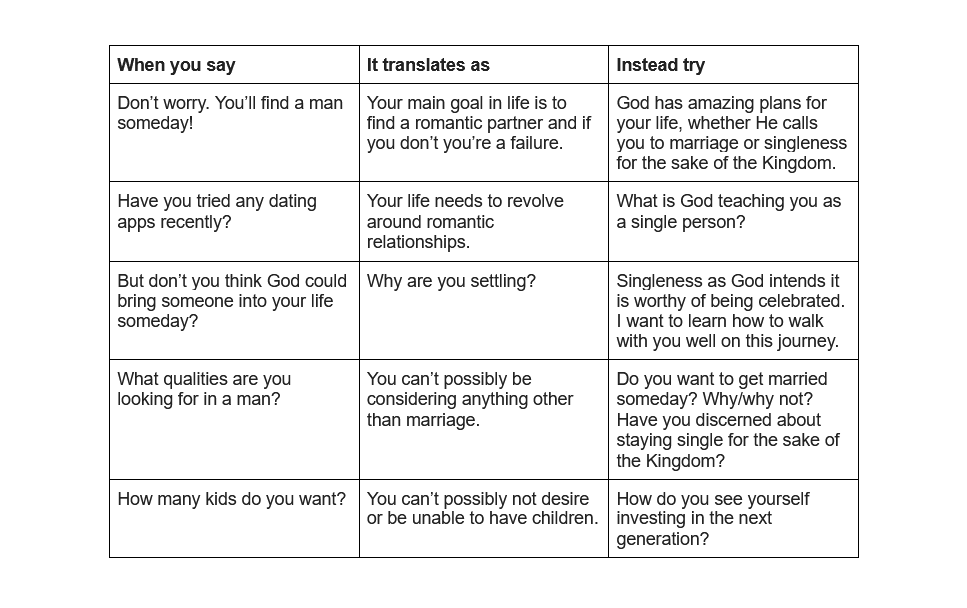This is the sixth in a year-long blog series by Lindsey Snyder about what pastors and parents need to know to better minister to LGB Christian women according to a historic sexual ethic. This post explores broken understandings of Christian womanhood and how to teach about biblical femininity.
“I just know I’ll struggle less with porn when I’m married. It’s just the way I work. When I’m committed to someone in real life, the temptations go away.”
“You’re going to be a wonderful mom.”
“How many kids do you want to have?”
“You’re going to find a man someday.”
“What are you looking for in your future husband?”
These are all messages that ex-boyfriends or friends have said to my face and they exemplify how Protestant Christian culture narrowly defines Christian womanhood. The primary way that some men see Christian women is as a potential spouse and mom, as well as an acceptable target for directing lust.
When many single women look in the mirror, they see the disappointment of not living up to the narrow standards of what it (supposedly) means to be a real Christian woman. Some see the likelihood of lifelong singleness and childlessness and, because of messages from cultural Christianity, despair. Others are simply confused about what womanhood means apart from the definitions of wife and mother. It is difficult to communicate the level of pressure women can feel.
Some women live with the painful knowledge that, if she remains single, she
-
won’t bring grandchildren to her parents
-
will have no opportunity to birth a child
-
could be looked down on as unwanted
-
will receive endless pity instead of being celebrated
-
will be at the whims of self-made matchmakers for the rest of her life despite her objections
-
will be ignored in sermon illustrations
-
will not get to experience what some erroneously call the greatest expression of love and intimacy: sex.
An LGB celibate Christian woman has potential to feel even more cursed by cultural Christianity, because there is an even greater likelihood she will not pursue marriage to a man.
These narrow expectations for what it looks like to be a real Christian woman are not from God. But if Christian womanhood is not solely defined by a woman’s marital status, kids, or ministry with and service to her husband, what is she actually defined by; and how does a gay woman fit into that picture?
In this blog post, we will explore the following questions:
-
What are the lies we have believed about biblical womanhood?
-
How have those lies impacted Christian women in general and gay Christian women in particular?
-
What is true biblical womanhood?
-
How can parents and pastors of LGB Christian women more accurately teach and support truly biblical womanhood?
“Biblical” Womanhood or Cultural Christianity Idol?
Who is that girl I see
Staring straight back at me?
Why is my reflection
Someone I don’t know?
Must I pretend that I’m
Someone else for all time?
When will my reflection show
Who I am inside?
If there was a theme song for closeted gay Christians, “Reflection” from the movie Mulan would be it. It’s also a fitting anthem for Christian women trying to fit into the cultural Christian standard of biblical womanhood. Both men and women suffer from over-prescription of gender norms, but women have to deal with even more rigid constructs. As women, we often feel the falsity of the identities prescribed to us and wonder why our reflection is showing us something so different than what is inside.
So, what are these lies? The briefest glance at the most popular books on Biblical womanhood reveal the widespread belief that true faithfulness for the Christian woman means one-sided submission to men, marrying a man, and becoming a mom.
Lie # 1: A faithful Christian woman must submit to men.
We can find the origins of this utilitarian, objectified view of women at the beginning of humanity and sin’s entrance into the world. In Genesis 3, God reveals the consequences of Adam and Eve’s disobedience. To Eve, part of the curse was, “. . .he will rule [with authority] over you and be responsible for you.” This seems to indicate that mutual authority and mutual submission between the sexes was God’s original good plan, but God predicted that post-Fall brokenness would give way to one-sided submission to husbands. Paul confirms that one-sided submission is a display of brokenness and mutual submission should be the aim of Christian marriages in Ephesians 5:21.
Just one verse later is an oft-quoted passage that some claim offers evidence that women are to submit to men:
“Wives, submit to your own husbands, as to the Lord. For the husband is the head of the wife even as Christ is the head of the church, his body, and is himself its Savior. Now as the church submits to Christ, so also wives should submit in everything to their husbands” (Ephesians 5:22-24).
There are two points to consider here. First, Paul is not speaking to women and men in the general sense. He is particularly targeting husbands and wives. Second, I believe there is a strong case against the interpretation of one-sided submission even within marriage, and that instead, men and women are called to submit to one another. The same verb used in “wives, submit to your husbands” was used in the prior verse as a call to “submit to one another out of reverence for Christ,” implying an equal level of voluntary submission between men and women.
Instead of rising above the curse with the generous help of the Holy Spirit, Christians have often allowed their broken views of women to influence their interpretation of Biblical passages relating to women. Meanwhile, Jesus’s radically inclusive treatment of women in the Gospels is conveniently ignored.
How has the lie of one-sided submission impacted women today?
-
Ungodly men use these passages to justify spousal abuse and failing to contribute equally to childrearing.
-
Christian women are commanded to be silent and told that speaking up against their husbands is sinful.
-
Dishonorable men use this passage to claim sex as a right and something they should be able to participate in with their wives any time they want.
-
Male pastors and elders in the Church prohibit women from leadership roles traditionally occupied by men, barring women from qualified spaces.
-
In particular, gay celibate women who desire to leverage their lifelong singleness for the sake of the Kingdom are thwarted from pastoral and church leadership roles by the teaching of male-exclusive leadership and one-sided submission.
Instead, the Bible consistently highlights women in leadership. Read about Deborah the judge in Judges 4-5. Micah 6:4 mentions Miriam as a co-leader of the Israelites along with Moses and Aaron. Women were entrusted with the first sighting of Jesus’s resurrection in a patriarchal culture. There is nothing particularly masculine or feminine about being a judge or a leader. Aimee Byrd, author of Recovering from Biblical Manhood and Womanhood describes the a biblically accurate view of male/female distinction this way,
“Creation of woman, and the first description of her, points to man’s need for a strength equal to him in a corresponding way — his need for a colaborer to reign with him. The focus of the text is unity and reciprocity. There are no implications of male/female distinction being authority and submission, which is what much of complementarian teaching insists is the creation distinction between man and woman. And we even see that in the fall Eve was equally culpable for her sin, as God directly addressed her” (Byrd, 2020, p. 116).
Men and women are equally culpable of sin, equally capable of leadership, equally called to lay down our lives for the sake of the Gospel.
A brief note about complementarianism: While I am unconvinced by the arguments for male-exclusive leadership and one-sided submission, some churches embody complementarian convictions in more nuanced ways that are less harmful to women.
Lie #2: A faithful Christian woman is defined by her relationship to men (particularly her husband).
The most well-known modern voices in discussions about biblical womanhood are ironically (yet not surprisingly) men. In 1991, prominent theologians John Piper and Wayne Grudem published Recovering Biblical Manhood and Womanhood: A Response to Evangelical Feminism, a collection of articles on the subject of gender roles that is more than 500 pages long. I’ll be transparent: I haven’t read the entire book. Perhaps someday I will. But I’ve read enough to conclude that, though Piper and Grudem address some biblical truths, they lean too heavily on extra-biblical narratives.
Piper offers the following definition of mature femininity: “At the heart of mature femininity is a freeing disposition to affirm, receive and nurture strength and leadership from worthy men in ways appropriate to a woman’s differing relationships.”
Is this really what it means to be a woman?
By no means! Rather, our Christian identity is found in relation to Christ, not in relation to anything fallen, including imperfect human men. Indeed, no individual should be defined primarily by the role he/she plays in relationship to other humans; whether it be wife, mother, daughter, or friend. These roles are important and God-given, but they don’t define our value nor contribute or detract from our womanhood. Instead, the Gospel defines women through the lens of who Christ is and what He has done for us. We are first and foremost God’s beloved children, not religious roleplayers.
Defining women as mere accessories to husbands has a devastating impact on the spiritual and emotional health of Christian women. If a woman’s utility is primarily found in her capacity to serve a husband, then celibate women are found useless. LGB Christian women are even more likely to be celibate than straight Christian women, and thus they are even more likely to be injured by Piper’s destructive definition of Christian femininity. Christian men do not have to deal with this in the same way. They are still generally expected to marry, but for them long-term singleness is more readily seen as healthy independence.
In her popular book Captivating, Stasi Eldredge writes, “A woman in the presence of a good man, a real man, loves being a woman. His strength allows her feminine heart to flourish. His pursuit draws out her beauty. And a man in the presence of a real woman loves being a man. Her beauty arouses him to play the man; it draws out his strength. She inspires him to be a hero.”
By implication, these damaging lies from the previous paragraph promote the following:
-
A woman can only truly appreciate being a woman when there’s a man around.
-
A man’s strength is necessary for a woman’s heart to flourish.
-
A woman becomes beautiful from a man’s pursuit of her.
-
Women give men their capacity to be real men.
-
Women function as inspirations for men to become heroes.
If a woman is taught any of these messages about finding her identity in a man other than Jesus, she will be running to men to find her self-worth and fulfillment, which can only be found in God. A woman’s identity, value, and worth come from Christ, not from humans.
Lie #3: A faithful Christian woman has biological children.
Because women uniquely carry the potential for the blessing and burden of childbirth, Christians throughout the ages have made bearing children an essential quality of being a faithful Christian woman. Psalm 127:3-4 is an oft-quoted verse regarding the blessing of biological children: “Behold, children are a heritage and gift from the Lord, the fruit of the womb a reward. Like arrows in the hand of a warrior, so are the children of one’s youth.” It’s true, being a mother is one of God’s great blessings, and bearing children was particularly important to God’s fulfillment of His covenant with Abraham.
However, the nature of the new covenant Jesus establishes and Christ’s words about singleness for the sake of the kingdom lift up women who are not mothers as equally faithful. First, Colossians 1:6 and 10 declare that the fruit we are commanded to bear in light of Christ’s resurrection is not physical children but spiritual children. Hebrews 8 reflects that Christ’s death established a new covenant where marriage is no longer necessary to fulfill God’s promises because we join God’s family by Christ’s work on the cross, not birth into a Jewish family. So the commandment for all to marry and procreate has been fulfilled by Christ’s death and resurrection. Marriage and procreation are still good, but they are no longer commanded for all.
Unfortunately, some Christian leaders continue to teach an old covenant view of women that bearing children is the greatest gift. These teachings lead women who are infertile and single women who do not have biological children to feel cheated, wondering if her lack of children is a sign of God’s disfavor. Adding insult to injury, flocks of biological families line the church pews while hesitating to invite single people into their lives as a permanent member of the family.
Men may feel some pressure to carry on the family name, but it is far less intense than what women typically have to deal with. Since men retain their procreative capacities late in life, there is no additional time crunch of fulfilling the “ultimate goal” of childbearing like there is for women. The too-frequent anxious references to biological clocks ticking is unhelpful both to the not-yet-married and the forever-single.
Again, gay Christian women in particular are thrown under the cultural Christianity bus. It is even more likely that a gay Christian woman will remain single and not have biological children, so the emphasis on children as the best gift from the Lord and as something essential to experience full womanhood produce unnecessary feelings of shame and uselessness.
True Biblical Womanhood
Many women wonder when our families, friends, the Church, and society at large will see how God created us instead of a version of womanhood that robs us of our true God-given potential. At worst, overly-prescriptive gender roles have led to severe forms of abuse. At best, they have stunted the spiritual and emotional growth of people made in the image of God. So what are some true messages that produce better fruit?
First, we must affirm that sexual difference does matter. If it didn’t, God would have just made one sex to image Him. Scripturally, the importance of the distinction is clear. When Adam looked around the garden for someone he could unite with and rule God’s Kingdom with, he found a suitable match only in Eve.
Christopher Roberts, author of Creation and Covenant: The Significance of Sexual Difference in the Moral Theology of Marriage, describes how Karl Barth, a prominent Swiss Reformed theologian, approaches the topic:
“It is of enormous significance that this human likeness to God, the imago Dei, is first manifest in sexual difference and not in anything abstractly spiritual in the human self.” There is something mysterious that sexual difference manifests about the nature of God. What does this mystery mean in regards to the reflection women see staring back at them every day? Barth offers one broad definition of what true masculinity and femininity is: ‘All other conditions of masculine and feminine being may be disputable except that God made the sexes for the covenant, that man and woman were not created differently in vain, and that they were created to be in relation to one another’” (Roberts, 2007, p. 142).
Let’s tease this out.
God made the sexes for the covenant.
Covenantal promises are a major theme of the Old Testament, namely between God and the nation of Israel. How does this theme relate to the difference between male and female? It is through the union of our differing sexualities that God fulfilled His promises to Israel.
“In the OT, the seed of Abraham needed to be carried forward; procreation and the sequence of generations maintaining Israel were theologically significant because of Yahweh’s covenant to be faithful to Israel. But, in an argument reminiscent of Augustine, with the birth of Jesus Christ, this history reached its goal, and the significance of a married couple for procreation changed. Being born of the spirit, a child of God through Christ was revealed as the one ultimately significant relation, and in this light, marriage is a provisional good . . . The man-woman relation has not changed, but marriage now has the dignity of a particular vocation and not a natural necessity.”(Roberts, 2007, p. 142)
Since the Old Testament covenant previewed the ultimate provision of the birth of Christ, it has been fulfilled. Therefore, does the male/female distinction no longer matter? Barth argues no. Rather, it is the necessity of marriage for all that has changed. Where once marriage and procreation were the only images of the covenant, requiring both sexes, marriage is now one of two equally good callings that point to Christ. Barth names Christ Himself and Paul the Apostle as two prime examples. The distinction between man and woman is still vital, though perhaps now for reasons more mysterious.
Man and woman were not created differently in vain. They were created to be in relation to one another.
Barth essentially says that all we know beyond the first point is that men are men and women are women. Christian marriage is the uniting of the two with an openness to children. To prescribe differences beyond that is extra biblical and could bring dangerous cultural concepts of gender into the Bible.
Man and woman reflect the image of God completely by existing and relating to one another.
I would argue that there is something of each sex that brings out certain aspects of the image of God. That something is not able to be simply labeled as “women show God’s nurturing side” and “men show God’s strength,” though that may often be true. One thing we do know, however, is that it was apparently “not good for man to be alone.” Many point to this passage as evidence that we are all meant for marriage. If that’s the case, Jesus and the Apostle Paul were sinning in their singleness. Obviously that’s not true. What is evident about this passage is that we are meant to be beings-in-relationship, coming together as men and women to image God. That does not mean we must all have sex with the opposite sex in order to achieve full personhood. Aimee Byrd indicates it does mean that there is something about interacting with the opposite sex that is an aspect of imaging God, and that it is not good for us to exclusively interact with our own sex.
Okay, so . . . sexual difference matters. It isn’t arbitrary. It was meant for the covenant between God and Israel. We are meant to be in relationship with one another particularly as male and female. But beyond these generalizations, are there any specific traits or roles that are distinctly for women? Clearly, only women can be mothers. Only women can be wives. But neither of those things defines womanhood. Femininity is not a role to play. A woman is feminine because . . . she is a woman.
Aimee Byrd says it well:
“Christian men and women don’t strive for so-called biblical masculinity or femininity, but Christlikeness. Rather than striving to prove our sexuality, the tone of our sexuality will express itself as we do this. I do see in Scripture that God made man and woman as true complements in this mission. My contributions, my living and moving, are distinctly feminine because I am a female. I do not need to do something a certain way to be feminine. I simply am feminine because I am female” (Byrd, 2020, p. 114).
Another brief note: As I wrote this post about sexual difference between male and female, I was reminded of the many intersex people around the world who experience a combination of male and female biology. If reading this discussion about the duality of the sexes hurts you in any way, I apologize. This world is complicated and there is much gray where many see black and white. You are precious and made in the image of God, too.
When will my reflection show who I am inside?
As you can probably see by now, some Christian leaders have over-prescribed Christian femininity, going beyond Scripture in ways that hurt women. A reverent and humble reading of Scripture reveals a meaningful sexual difference between men and women displayed in Christian marriage. There is also indication that men and women reveal different aspects of the image of God individually and in-relation to one another in mysterious ways. But, we would do well to recognize that any prescriptions beyond these merely indicate cultural concepts of gender.
So, pastors and parents, how can we properly teach what it means to be a godly woman? By teaching what it means to be a disciple of Christ. A godly woman is called to repentance and restoration. She is called to surrender her rights for the sake of the Good News Jesus brings. She is to understand that being a woman matters as a reflection of the image of God, most clearly within Christian marriage, but also more mysteriously but just as legitimately in singleness.
In other words…
She is free to be a CEO without shame.
She is free to be a wife and mother without shame.
She is free to remain single for the sake of the Kingdom without shame.
Do not burden your children or congregants with extra-biblical pressures of “what it means to be a biblical woman.” Do not add to the already heavy burdens of this world. Encourage the fruits of the Spirit. Live a life of love towards Jesus and others.
“It is for freedom that Christ has set us free. Stand firm, then, and do not let yourselves be burdened again by a yoke of slavery . . . But the fruit of the Spirit is love, joy, peace, forbearance, kindness, goodness, faithfulness, gentleness and self-control. Against such things there is no law.” (Galatians 5:1;22)
That’s what it means to be a man or woman of God.
There are examples of presumably single women in the Bible who lived fulfilling lives in Christ. In the stories of Mary and Martha, Mary chooses a culturally unconventional position learning at the feet of Jesus (Luke 10:38-42). Does Jesus ask her if she’s found a husband yet? Does he pity her for not having biological children? No. Jesus praises Mary for choosing Him above all, even above the culturally-prescribed responsibility of womanhood that would have rebuked her for not being a proper host (like her sister). Another example is Junia, a first-century Christian, who is not defined by service to her husband and kids but as “outstanding among the apostles” (Romans 16:7).
Sexual differentiation will be a reality, even in heaven (in some way). Jesus, even in his glorified state, remains a man. We too, will likely retain our maleness or femaleness. We are gendered beings that thrive in relation to one another, just as the Trinity thrives in relationship as Father, Son, and Holy Spirit. This is what we should teach.
Below are some concrete examples of what you might have said to a single woman before, why it is damaging, and what you could try saying instead.

Let’s end with a prayer. Would you join me?
Creator of beauty and purpose,
Thank You for reflecting Your image through the creation of male and female. We praise You specifically today for women. Thank You for the grand purposes You’ve given to women in and of themselves. Their bodies and spirits tell a story about the reality of Who You Are. We praise You for your design of unity in sexual difference and the ability for women to birth new life within marriage. We praise You for the single celibate women who are able to devote more time and attention to Your Kingdom purposes.
Please reveal to each of Your daughters their inestimable worth. Show them that in You they are complete and full of purpose, whether gay or straight, married or single, with or without children. Help them to feel at a heart level that being a woman matters, and that You created them to thrive in their sexuality.
Give us all the grace and wisdom to encourage and lift up women in spite of a cultural Christian bubble that tries to steal or dampen their voices.
In Jesus’s Name,
Amen.
If this glimpse into the lives and experiences of gay Christian women was meaningful to you, Lindsey’s half-day training dives even deeper. Get access to the recording today and gain tools for real-life ministry and relationships at equipyourcommunity.org/premium.
Book References
Creation and Covenant: The Significance of Sexual Difference in the Moral Theology of Marriage by Christopher Roberts
Recovering Biblical Manhood and Womanhood: A Response to Evangelical Feminism by John Piper and Wayne Grudem
Recovering from Biblical Manhood and Womanhood by Aimee Byrd
Captivating Revised and Updated: Unveiling the Mystery of a Woman’s Soul by John & Stasi Eldredge







Melanie
Wow! This is well-crafted and boldly stated. Glad you are bring this conversation to the table.